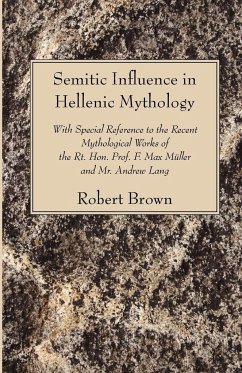
Semitic Influence in Hellenic Mythology
Versandkostenfrei!
Versandfertig in 1-2 Wochen
25,99 €
inkl. MwSt.

PAYBACK Punkte
13 °P sammeln!
The leaders in England of two schools of mythology, based mainly in the one case on Aryan linguistics and in the other on anthropology, have recently published their revised, and probably final, conclusions. The time, therefore, seems oportune for a statement of the principles of a third School, which, for present purposes, I may style the Aryo-Semitic. Its members, whilst paying every respect to the system of Aryan philology, and fully recognizing the vast results that have sprung from the scientific application of Aryan linguistics, are nevertheless of opinion that the Aryanists have been un...
The leaders in England of two schools of mythology, based mainly in the one case on Aryan linguistics and in the other on anthropology, have recently published their revised, and probably final, conclusions. The time, therefore, seems oportune for a statement of the principles of a third School, which, for present purposes, I may style the Aryo-Semitic. Its members, whilst paying every respect to the system of Aryan philology, and fully recognizing the vast results that have sprung from the scientific application of Aryan linguistics, are nevertheless of opinion that the Aryanists have been unable to explain Hellenic mythology and Hellenic archaic history as a whole, because they have almost wholly ignored or denied the existence of that great mass of Semitic influence, which the Aryo-Semitic School hold is to be found throughout the length and breadth of Hellas. This latter School, moreover, is in entire sympathy with the researches of anthropology in general, and of folklore in particular.














